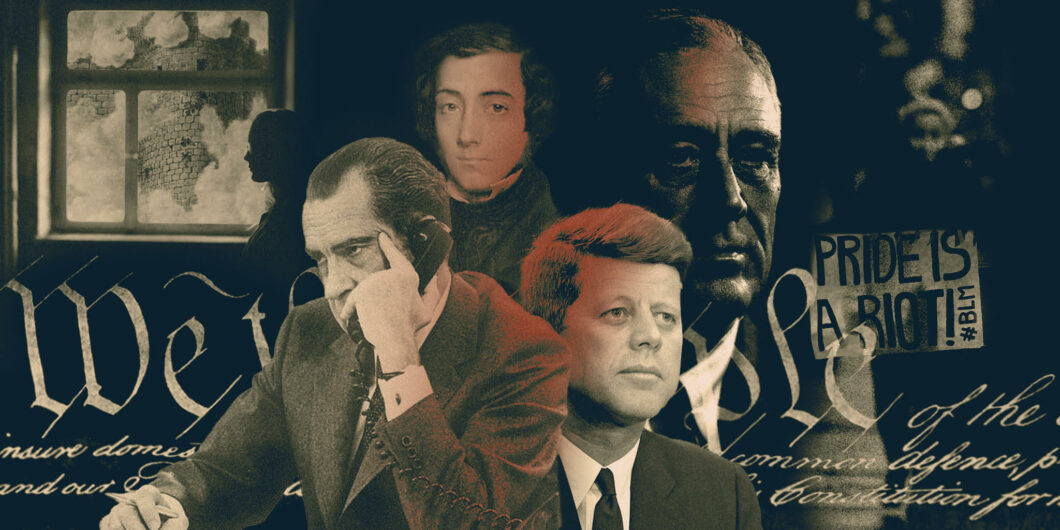Republican presidential candidates will likely use nominee lists to demonstrate their commitments to originalism and constitutional government.
Restoring Self-Government
Daniel Miller’s sprawling essay “American Counterrevolution” argues in florid tones that the West and America are currently being devoured by revolution. Miller notes that “the distinctions which structured Western thought for millennia are in crisis.” What once stood “between the public and the private, between men and women, between the profane and the sacred, and between the guilty and the innocent” has broken down. This revolution—like all revolutions—promises us something new, but Miller notes earlier in the essay that all political revolutions are the same in their essentials. Miller recalls different observations made by scholars on political revolution to the effect that ideologues signify that “revolution inaugurates a rupture in the continuum of history itself: all the old laws are suspended; everything is made new.” But not so, Miller observes, because “this messianic delusion is recurrent to the revolutionary phenomenon: in fact, almost nothing in history is more predictable and less singular.” And nowhere is revolution more at home than in modernity, “the epoch of revolution unbound.”
We might think that if revolution is constantly repeated, then surely, we know how to deal with it. Maybe ideological revolution is what Harvey Mansfield said: “Manliness run amok,” a nihilistic revolt against deterministic and reductionist theories that man is chained by nature and/or that God is dead. The communist or fascist endeavored to prove that a new world can be built by man, and that nothing is determined. This existential rebellion has always been resisted by men and women who articulate that there is a nature, ground, and purpose to life. We’re in a story that we didn’t create, but we must participate in it as free and virtuous persons.
Miller’s essay spans centuries, swiftly moving through the revolutionary implications of state sovereignty supplanting Catholic Church authority in early modernity to give us the unified state and its mystical power, then on to the French Revolution, and finally some observations on this dismal American scene. How might we Americans know that we are beset by a “Revolution,” as opposed to, say, incompetent federal, state, and local governments run by progressive ideologues for their self-interested benefit? And, if we are in a revolution, what should we do about it?
Miller stresses that the French Revolution, and in particular, its period of sheer terror that commenced in 1793, provides the example par excellence of revolution and one that we can look to for a comparison and evaluation of our situation. He observes the following:
The slide into chaos in France following the execution of Louis XVI in January established the pattern which all subsequent revolutions repeated. In February, conscription was introduced across France, and a Royalist revolt began in the Vendée. In April, perceiving conspiracies everywhere, the Committee of Public Safety was established with a mandate to eradicate all opposition. By October, it had liquidated the leadership of the first year of the Revolution, and by December, it had moved beyond the guillotine and was organizing mass drownings in the Loire.
Quoting Robespierre from this period: “If the basis of popular government in peacetime is virtue,” then “the basis of popular government during a revolution is both virtue and terror.” As we say, the revolution devoured its own. Robespierre met his death in 1794, a denounced enemy of the revolution he fathered.
Miller provides a telling bit from this period—one that we might understand—when “investigations were eliminated so that citizens could be charged merely by being denounced, and the accused were deprived of their right to an attorney and to cross-examine witnesses.” Thousands were executed in this way. Cancel culture doesn’t send its victims to the guillotine, but it does inflict psychic pain on them and often removes them from employment, friendships, and the good opinion of many people. As we were told during the attempt to destroy the career, character, and nomination of then federal appellate judge Brett Kavanaugh to the Supreme Court in 2018, “believe all women.” The public ritual denouncements of those deemed racist, sexist, homophobic, anti-immigrant, etc., occur frequently and according to criteria that in many cases cannot be challenged by the accused or their defenders. Too many of us have either watched these attempts and remained silent out of fear, or we have been on the business end of such accusations. That they are now increasingly uttered for nothing more than political gain is also rendering them less and less effective.
But on to the real engine of revolution in America, which, Miller states, is the Civil Rights Act of 1964 and the administrative state as constructed by FDR’s New Deal, which has steadily accumulated power for almost a century. As revolutions go, this has been a long, slow one.
The Civil Rights Act (CRA) only makes sense in its original color-blind understanding, the public argument that was, in fact, used to justify it and obtain its passage. However, by the end of the 1960s, Progressives had morphed the CRA into something else entirely, using race to make discriminatory decisions in employment (public and private), and education, and shaping Americans to be constantly aware of a racist past that demanded “affirmative action.” Evidence of racial discrimination is not even required under disparate impact theory, consistent patterns of unequal outcomes among races can be used to indict an institution for violating the Civil Rights Act. Reagan administration lawyers and the judges and justices that it appointed attempted, in many cases, the long rollback of this perversion of the statute and found limited success. But they were undone by more federal civil rights legislation passed during George H. W. Bush’s presidency that specifically aimed at rolling back these judicial decisions.
The most recent ruling in 2023 by the Supreme Court that held affirmative action programs at Harvard University and the University of North Carolina at Chapel Hill to be violations of the Equal Protection Clause in the Fourteenth Amendment is a substantial move toward this color-blind understanding, one that should also inform how we think about the Civil Rights Act. The charge of revolution is hard to sustain when we learn that conservatives have achieved a long-sustained constitutional and political objective, favored by a majority of the minorities in the same racial groups that benefit most from these types of racial classification schemes.
Our Progressive opponents continue to afford us ample opportunity to vindicate our ideas and convictions against their own.
The goal must now be to extend this precedent even further into private and public employment rules and permit Americans to be equal under the law. So, yes, tremendous mischief and power were created by the perversion of the CRA from its original meaning. But that effort now finds itself equally matched, if not on a course for extinction. Originalist and natural law arguments have slowly been accepted and forced racial double standards advocates to declare who they are in explicit terms. Most Americans don’t like it one bit.
This is not to gainsay the current imposition of Diversity, Equity, and Inclusion (DEI) ideology that now fills our education system, much of the private and public sectors, and most disturbing of all, the military. DEI is totalitarian in its implications, but as more and more Americans see it in its full evil light, it now increasingly finds itself on its back foot. Nowhere has it been more concentrated than in universities and colleges, and nowhere does its self-perpetuating hatred stand more fully revealed for all to see.
Miller’s description of our social and political life isn’t entirely wrong. But he fails to do justice to the numerous ways the antibodies of our constitutional system of government and the habits, mores, and outlook that it guides continue to match the Left, even in its most dastardly and reality-denying form: 6’3” teenage boys in skirts playing on girls’ athletic teams. Fathers watching a 16-year-old male slam the ball on their smaller daughters or throw them to the ground are told that it’s fine, just fine. But if we take the hard edge of progressive attempts to forgo the regular administration of criminal justice, advance DEI programs, flout the rule of law when it suits political objectives, and punish political opponents, among other items, we also must consider the aggressive confrontation with these forces by a range of American citizens and elected officials.
Those opposed to these progressive ideas occupy tremendous positions in government and increasingly use that power to rebut them. Media and corporations are a different matter entirely, but even here, we witness a pulling away from the strident appeals and campaigns that emerged in the horrible Summer of 2020, as consumers and legislators continue to record their disagreements. It is a strange kind of revolution when its opponents have popular and lawful means to contest it and do so with success. What those of us opposed to the Left’s current program don’t yet have is the ability to defeat it outright. So, we engage in politics for the opportunity to steadily undermine the so-called woke agenda. Defeating DEI will turn on members of various minority groups disaffiliating with identity politics and progressive politics and stating why in various public forums. That process is currently underway and has never looked more promising. Announcing that conservatism or the center-right believes that its counterrevolution calls for elimination of the CRA would likely send every wrong signal imaginable to those questioning or on the verge of revoking their long-term membership on the political left.
The administrative state, Miller insists, is another part of the revolution because it’s an instrument of the secular salvific process of history that some progressives believe will conclude in egalitarianism, net zero energy, and all-around socialism. These are sweeping objectives that certainly require draconian rules, enacted and enforced by bureaucrats insulated from politics. The more likely scenario of the administrative state is unbound statism where presidents use old, broadly worded, and seldom-used sections of statutes to support contemporary leftist objectives that Congress balks at approving. This part of our government needs to be halted and remade. Reforming the administrative state occupies no end of thinking in the conservative and libertarian worlds, and to date, limited progress has been achieved. Making matters difficult—and not emblematic of revolution—is the high political market demand made by voters for regulation, which Congress has acceded to. The disciplining of the administrative state will likely come through new doctrinal victories in the federal courts that limit its powers. This could also be coupled with a congressional membership that actually wants to be a part of government by writing, debating, and approving legislation with clearly defined rules that don’t afford open-ended powers to bureaucrats. Talk about a counterrevolution.
That is to say, the one thing most needed regarding the administrative state is the recovery of politics and the institution of Congress as a deliberative body. There are many obstacles standing in the way of that recovery, but one that should be surmounted by both the Left and Right in America is to cease viewing the other as implacable enemies who must be defeated at virtually any price. We either want to be self-governing or we don’t.
Yet, for all of this, Daniel Miller’s argument that we are in a revolution and that the proper response necessitates counterrevolution, which he leaves unspecified in content, is surely a bridge too far. Because Miller’s “Counterrevolution” is unclear, I can’t really offer much of a response to it. It evokes Hannah Arendt on the need to purify public liberties in a manner analogous to that performed by “colonial elites” in the Declaration of Independence, one of several indications that Miller’s counterrevolution will be top-down. But the Declaration was not as elite-driven as he suggests. As Pauline Maier beautifully demonstrates in American Scripture, there were many such declarations emerging from numerous communities, entities, and localities in revolutionary America. The urge for a new constitutional freedom was in the fire and the blood of the Americans. We might better think of our Declaration as the capstone to a process of spirited conversation and deliberation reverberating amongst a people who were realizing that while legally separate, they were also forming a unity whose power would be needed to win their liberties. They chose to be self-governing, and to invoke the republican ideas that they had been practicing and refining for over 150 years. Their problem was the English had again reverted their unwritten constitution to an authoritarian posture, justifying violence against the North American colonists.
Our Progressive opponents continue to afford us ample opportunity to vindicate our ideas and convictions against their own. That process is slow, ambiguous, and fraught with disappointment. What we should do is again choose to be self-governing by clearly proclaiming Progressive constitutional abuses and how we as a constitutional people, bound by law and moral judgment, intend to redress it. But that will require us to begin with being conservative about the one thing most needful: constitutionalism and the citizens of virtue who must maintain it.
How are we doing on that question? The choices currently range from a dementia patient trying to be POTUS and a vitriolic ex-president who wants to defeat the current president while demanding our ultimate loyalty. Basic constitutional work stands before us. Talk of counterrevolution is at best a distraction from this hard course.


